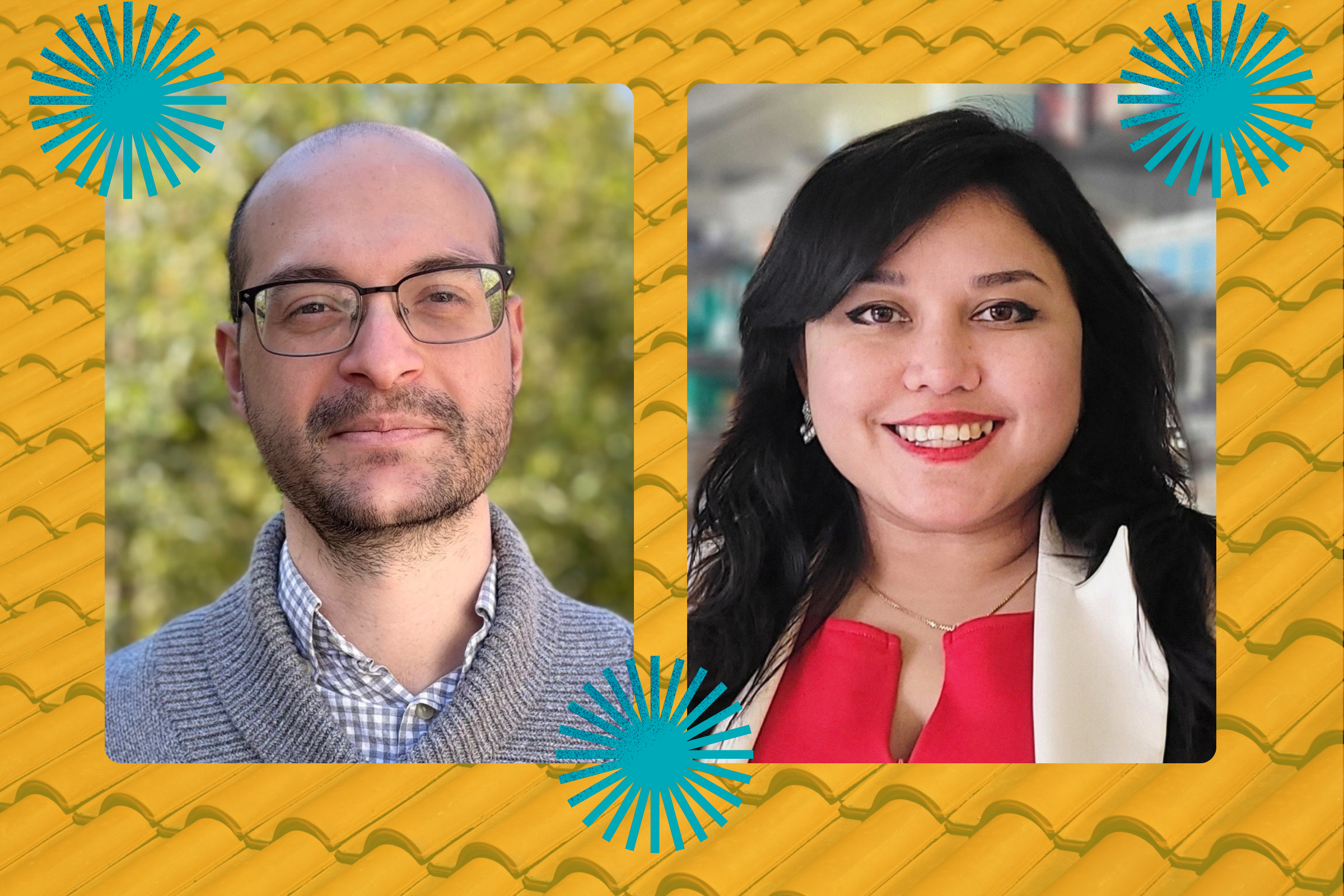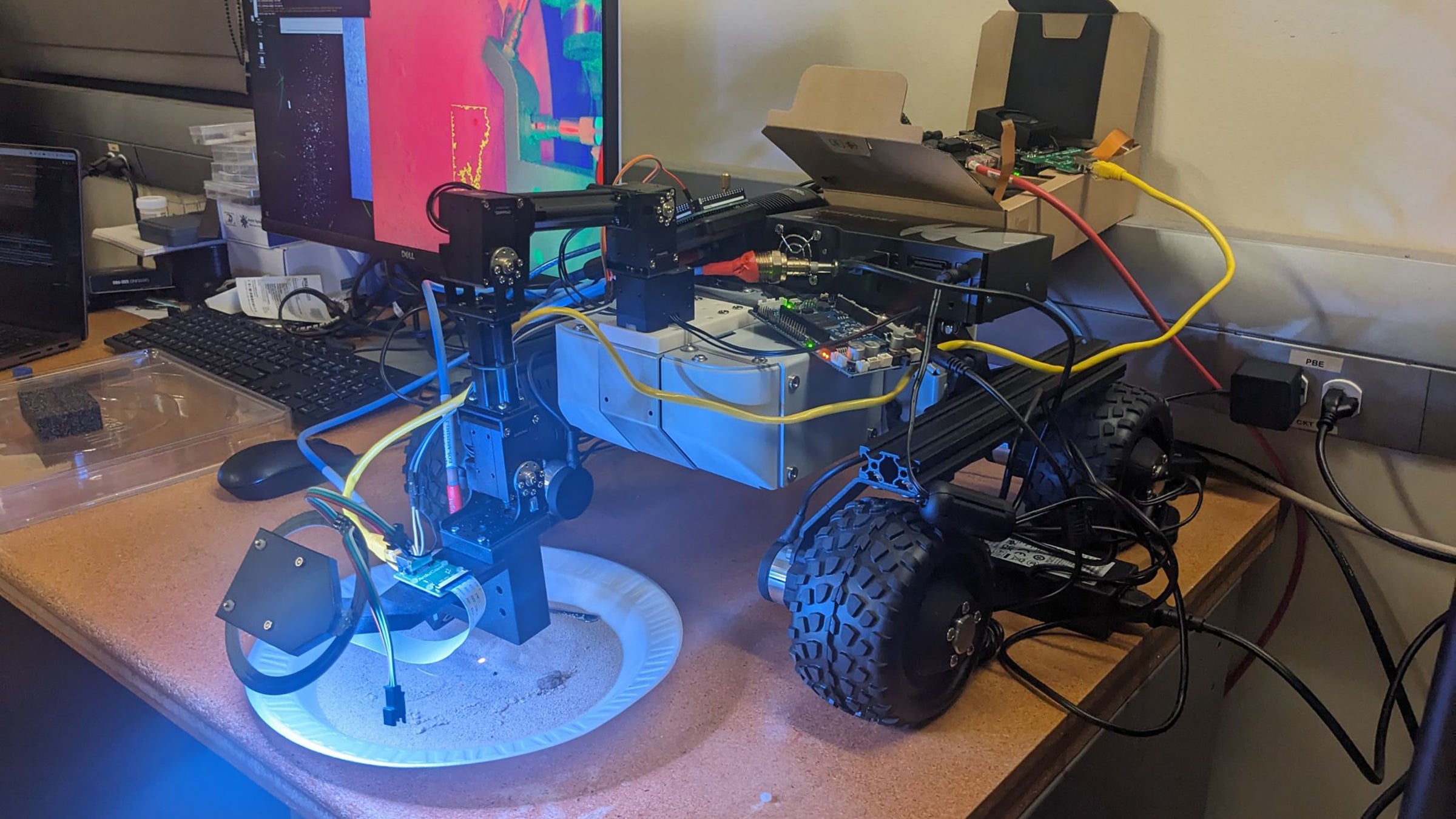Hear from Three Seniors Among This Year’s Graduates of Distinction
Several graduating seniors from CNS have been recognized for their distinctive accomplishments, including the three individuals highlighted here.

Ali Askari (left), Gift Owolabi (center) and Zamira Harris-Ryden (right) are among this year's College of Natural Sciences Graduates of Distinction.
Each year, Texas Science celebrates graduating seniors whose distinctive accomplishments will be remembered long after their time on the Forty Acres.
The College of Natural Sciences honors outstanding graduates every year who made their mark during their time at The University of Texas at Austin while exemplifying our values. This year, 136 students have been named winners of college distinctions due to their distinguished records of service, excellence, leadership, research achievement, contributions to our community of belonging and entrepreneurial endeavors. They are among our Graduates of Distinction being celebrated this week, and they include this year’s Dean’s Honored Graduates.
We sat down with three of the students who this year received more than one college distinction to learn more about their experiences over the last four years at UT Austin and in the College of Natural Sciences. For a complete list of this year’s distinction winners, please see our commencement program.
Ali Askari (BSA, Biochemistry)
Distinction in Research & Distinction in Entrepreneurship
Why did you choose UT? Why biochemistry?
I am from Pflugerville and went to Pflugerville High School, so UT still felt a bit like home to me. I knew of the school’s many opportunities for research which I really liked. Also, the FRI program was appealing to me. I came in as a neuroscience major and switched at the end of my freshman year. I wanted something more broad, and I know biochemistry has a variety of research areas. If I go to graduate school, I could choose engineering, biochemical engineering or something else, in addition to many career opportunities.
Tell me about your research experience at UT.
I was in the Aptamer Stream FRI group. Aptamers are similar to antibodies. Imagine you have a target, which could be a protein or a virus. The aptamer could be small DNA or RNA which could specifically recognize a target to attach to, and maybe prevent the virus from spreading. During most of my time with this FRI stream, I created one of the world’s largest publicly accessible aptamer databases, which is now used by researchers all around the world.
What are your post-graduation goals or plans?
I’m interested in going to medical school and becoming a physician while also conducting research.
Were you involved in any extracurricular activities or leadership roles?
I am the financial mentor for the Health Careers Mentorship Program. I am also the volunteer department lead for the Emergency Department and a member of the Student Advisory Committee, both within the St. David’s Hospital volunteer program. Through this, we make sure patients have warm blankets, water and food among a variety of other tasks.
Which professors/mentors have been especially helpful during your time here?
My FRI research educator, Gwendolyn Stovall, has been amazing and supportive.
Zamira Harris-Ryden (BSA, Chemistry)
Distinction in Research and Distinction in Diversity, Equity and Inclusion
Why did you come to UT and pursue chemistry?
I chose UT because I really liked the campus environment when I toured in high school and because the school offers so many options. Even though I didn’t know what career I wanted, I knew UT would provide me with the resources and opportunities to explore my interests.
I originally came in as a biology major, and switched to chemistry after my first semester. The professor for my general chemistry classes, Stacy Sparks, guided me in understanding the possible paths chemistry majors could pursue.
Tell me about your research experience here at UT.
I was lucky to partake in an FRI group with the Urban Ecosystems Stream starting my first semester. I like the project-based aspect of the research and the collaboration involved. Later on, I had the opportunity to mentor in that lab, which I really enjoyed. My mentors helped me greatly during my freshman year, so I wanted to give back. FRI provided me with a foundation as a researcher. I continued my research endeavors in another lab led by Cassandra Callman where I could also collaborate with graduate students.
During my junior year, I participated in both the FRI and Dr. Callman’s lab. But, this year, I’ve dedicated more of my time to Dr. Callman’s lab. So far, my work has primarily focused on organic synthesis and creating different monomer units to be made into longer polymers. Then, the binding of the polymers are tested.
What were some of your other extracurricular activities through UT?
I’m on the legislative committee for the Natural Sciences Council. Within that group, I have written legislation seeking to change academic policies within CNS and just within the entire university. One of the projects I worked on was to increase the visibility of underrepresented communities in STEM. On the exterior of Welch Hall, there are names of famous scientists, but no women are represented. My original proposal was to include the names of female and other minority scientists, but we learned that will not be possible. The person who will step into my role next year is going to redirect the project to include visual displays inside of Welch Hall rather than on the exterior building. So, for example, we may include names of underrepresented scientists on the TVs throughout Welch Hall.
Tell me about your post-graduation plans or goals.
This fall, I’ll be starting at Northwestern University to pursue a Ph.D. in organic chemistry. I would like to conduct chemistry research with a biological application.
Who are some mentors you appreciate?
I’m just really grateful for the professors who have mentored me, like Sparks, Callman and Stuart Reichler. There is no way I would be where I am now without them. They really inspired me to pursue a career in academia.
Gift Owolabi (BSA, Biology)
Distinction in Research and Distinction in Diversity, Equity and Inclusion
How did you become interested in vision therapy?
I used Handshake [the university’s job board] and saw the opening role to be a scribe for the Optometry Center for Vision Therapy. While being interviewed, the team thought my skills matched with the roles of a vision therapist because I made it clear that I wanted direct patient contact. They asked if I would be interested in being a vision therapist instead of the scribe, and I accepted the role.
I started out shadowing their vision therapist and optometrist, next worked with supervision and then was on my own. Through the position, I work with many kids and adults, many of whom have 20/20 vision. It’s not their eyesight that is the issue; it’s how they use their eyes, especially when looking at things up close or scanning pages. A vision therapist is similar to a speech therapist, but for eyes.
Ultimately, I wrote my thesis on visual therapy for children with ADHD.
I had this position for over a year and it was amazing. I made many great connections in addition to introducing peers to the position.
Why did you additionally pursue a creative writing certificate?
Since high school, I have been writing fiction and fantasy short stories and novels. When I came to UT, I knew I wanted to pursue biology, but I also didn’t want to completely stop writing.
Tell me about some of your extracurricular experiences here at UT.
I have been involved with DEI initiatives to provide outreach for Black and minority students applying for CNS honors. I’ve been able to talk with prospective students who are interested in the program but may not see themselves represented.
My job is to say, “Hey, I’m here and had a wonderful time. There is a growing community of Black and Brown students who would love to have you.”
I have written articles in Catalyst [the Natural Sciences Council publication] and I also became the managing editor.
I ended up finding my best friends and current roommates through Delta Epsilon Mu, a pre-health fraternity, and stayed with the program throughout my time at UT. I wanted to give back to the organization because it helped me, so I ended up serving as president this year. We have over 100 members, many who came to college without a solid network. We try to help members in determining whether they want to pursue medicine, pre-PA, pre-nursing or something else. Sometimes, people realize they don’t want to pursue healthcare at all, and that’s okay. We still want to have them and welcome their positive contributions in other ways.
Why did you choose Columbia for medical school?
I visited New York City for the first time last year and I loved it, in addition to Columbia’s diverse community. Several students and mentors made it clear that I was welcome, and I would feel supported and encouraged.
Columbia actually offers a Masters in Narrative Medicine, so once again, I can practice my writing even in medical school. I can channel my writing into social justice and medicine topics.
Who have some of your mentors been at UT?
I want to give a shout-out to Sara Corson, the current honor’s program director and the past honor’s director, Madison Searle. I also want to highlight Shagufta Shabbir who was always supportive and kind.



